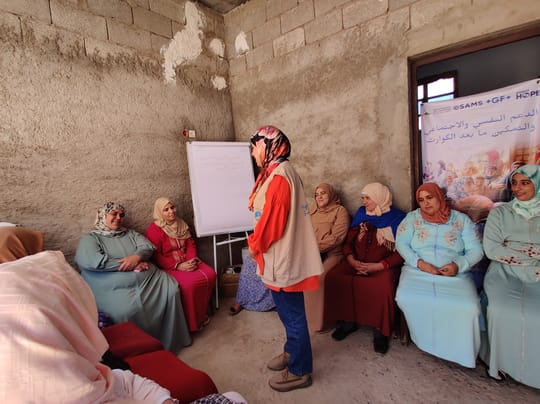Empowerment as an act of enhancement, not creation

For many, the act of empowerment is one of creation — it is imported into contexts in which it had not previously existed. This conceptual framework of empowerment, however, is simplistic and fundamentally at odds with the lived reality of many women with whom the High Atlas Foundation engages. So instead, HAF’s IMAGINE Workshop which nominally seeks to empower women has adopted what can only be described as a sort of enhancement methodology for empowerment. This workshop intimately understands that women’s strength is already localized within communities and needs only to be enhanced.
For adults, imagination is often seen as a frivolous escape from reality. However, the IMAGINE Workshop implicitly subverts this simplistic understanding of imagination in favor of tools which rely upon the radical and universal power of imagination as articulated through stories and meditation. Through this program, and specifically through imagination and storytelling, participating women are given the tools to develop their confidence and to amplify and name their agency. The IMAGINE Workshop’s distinct methodology is clearly demonstrated through the way in which HAF facilitators position themselves in relation to participating women.
In the Melah of Marrakech in late May 2024, HAF facilitators began the workshop by emphasizing that they were not “teachers” but rather “facilitators” who would work to promote mutual learning. The facilitators, in their own words, were not the only ones with expertise. But this was not a dynamic that was immediately comfortable for the participating women.
Despite first-name introductions, each participant called the facilitators “oustadha,” a term of respect most frequently used for a teacher. And this term was not wholly inaccurate either. The facilitators asked the group of women to tell their own story of the September 2023 earthquake. As the women narrated their stories one-by-one the facilitators asked questions to draw out details, as a teacher might do.
The facilitators then began to introduce important concepts, asking the participants what they associated with stress and providing the metaphor of elasticity to describe a sustainable path through life. During the first morning, the facilitators were emphatically the experts and the participants were the students. In short, it became clear that mutual learning was an aspiration not an easily assumed reality.
By the fourth and final day, however, this community had blossomed into a space that transcended the teacher-student divide. The facilitators were no longer the only people dispensing advice. In fact, the school-room-like silence of the first morning had entirely been replaced by a cacophony of voices and laughter. With each imaginative exercise, the women had created a community based on shared learning.
Through guided meditation, participants accessed their imaginations and began a process of self-discovery. They illustrated discipline and commitment and support systems in various hues of colored pencils. They named what made them powerful and what made them feel unpowerful. They visualized living creatures whom they asked for advice in understanding their spiritual gifts. And by the fourth day, they had begun to carry these drawings, words, and visualizations into their daily lives.
Consider Halima, one of the participants. She has recently moved to Marrakech after growing up in a small town. She is a single mother of two boys ages ten and sixteen. One of the things from which she derives strength is healthy food including tagines, kefta, and vegetables. She prefers tea — without sugar — to coffee because it is less sugary. And unsurprisingly, fries are very much on the “forbidden” food list for her children.
When the facilitators conducted guided meditation, Halima saw nothing but darkness in her “support system room” which reminded her of how the people she has loved have let her down. But the facilitators helped her realize how the darkness was not as empty as it first seemed. As a single mother, she had spent years dedicating herself to her children’s futures, endeavoring to support them in the way she had never been supported. This, more than any personal support system, was a well of strength from which she could draw agency and power.
Halima, and the other women of this workshop, already embody strength and resilience in the face of great difficulty. They do not need power to be given to them but rather to have the power that is already inside them amplified and named.
As such, empowerment, according to the workshop, is not something which must be manufactured. It is as innate as imagination and must simply be carefully enhanced.
Naima Sawaya is a student at the University of Virginia and an intern at the High Atlas Foundation in Morocco.